On a June night in 1777, Gen. Alexander Scammell poured out his heart in a letter to Abigail Bishop of Mistic, Mass. He had marched to Fort Ticonderoga, where the Continental Army hoped to fend off a British attack. He told her he was concerned about the sufferings of his men, he disliked court-martial duties and he longed to marry her.
For four long years, Alexander Scammell pleaded with Abigail Bishop to marry him. He was a battlefield hero, a rising star in the Continental Army and a favorite of George Washington. The thought of his possible future happiness with her sustained him through the hardship and fatigue of war.
Abigail Bishop refused to marry him until he left the army. She led a life of privilege in Mistic (now Medford), where her parents hosted Washington, John Adams and John Quincy Adams. At times she raised his hopes. At others, she dashed them.
In the end, Abigail Bishop drew a line in the sand. She wouldn’t consider marrying Alexander Scammell unless he quit the army. Scammell, torn between his love for her and his love for his country, couldn’t have both.
Abigail and Alexander
Abigail Bishop was born Oct. 5, 1753 in Mistic, the daughter of John and Abigail Tufts Bishop. Her mother was an intimate friend of John Adams’ wife, her cousin Abigail. The Bishops lived in a big house on High Street, where Alexander Scammell probably met Miss ‘Nabby’ while visiting her parents.
Alexander Scammell was handsome, dashing, tall for his era at 6’2” and unusually likable. He was a member of George Washington’s inner circle, one of the few who could make him laugh with his stories and jokes.
He was born March 27, 1747 in Mendon, now Milford, Mass., the son of a doctor and his wife who had emigrated from England. Alexander Scammell graduated from Harvard, taught school in Plymouth and Kingston, Mass., then did some surveying in New Hampshire and Maine, where he became a proprietor of the town of Shapleigh.
He then studied law under John Sullivan in Durham, N.H., joining him in the raid on Fort William and Mary in 1774. During the raid, Scammell hauled down the British flag flying over the fort, the first patriot to do so.
Alexander Scammell Goes to War
When he heard about the Battles of Lexington and Concord, he joined the New Hampshire Regiment, part of Sullivan’s brigade, as a major. He probably met Abigail Bishop during the Siege of Boston.
After the British evacuated Boston in March 1776, Alexander Scammell’s regiment was ordered to provide reinforcements during what turned out to be the disastrous invasion of Canada. He sailed up the Hudson River to Albany and proceeded to Fort St. John. There he viewed the forts and fields where patriots had been killed.
Everything was in confusion, the cold was disagreeable and mosquitos drove him to distraction.
Abigail sent him a letter, a ‘dear epistle’ that gave him ‘a new flow of spirits’ though she accused him of insincerity. On June 2, 1776, he wrote back to her:
Tis cruel, my dearest, tis cruel to ever think I am insincere You wrong me to entertain the least Suspicion of that kind…I expect a warm Summer. But console myself with the Hopes of being so happy as to see you next Winter, which will richly make amends for the greatest Fatigues.
Alexander Scammell was ordered to return to Fort Ticonderoga, where the Continental Army had staged the failed invasion. He arrived on May 20, 1776, after a severe, 100-mile march on foot, ‘through the woods in an excessive miry Road, wet, rainy weather accompanied with Snow and Hail.’
Disagreeable court-martial duties then consumed him, and he didn’t write to Abigail Bishop until June 8, 1776.
Torn
He told her how much he wanted to marry her, but he couldn’t leave the army:
Tho I should much rather be able to retire to enjoy the sweets of Liberty and domestick happiness, but more especially the pleasing Charms of your dear Company. But so long as my Country demands my utmost Exertions, I must devote myself entirly to it’s Service
Then he got mushy:
The tender moments which we have spent together still, and ever will, remain fresh in my memory—You are ever present in my enraptur’d heart—& a mutual return of Affection from you, I find more and more necessary to my Happiness—cherish the Love my dearest Nabby, which you have so generously professed for me—Altho I am far distant from you, still remember that I am your constant, and most affectionate admirerer.
As always, he begged her to write.
Washington
By August Alexander Scammell served as aide-de-camp to Gen. John Sullivan, and in September they went to New York to join Washington’s forces. A series of defeats sent Washington and his army on the run to New Jersey.
Scammell hadn’t heard from Abigail since he left Ticonderoga. On Oct. 29, 1776, he dashed off a quick note to her:
I have not had the Happiness of hearing from you since I left Ticonteroga. Nor had Opporunity to write to you since. My Passion flatters me that you have had no Opportunity of writing. I long for the happy moment when I can press you to my Heart. … My dear Girl write to me every Opportunity. A Letter from you would soften the Fatigues of War.
Alexander Scammell remained with Washington as the British chased the shrinking American army through New Jersey. On Christmas night, Alexander Scammell crossed the Delaware in Washington’s boat before the morale-boosting victory of the Battle of Trenton. A week later, he distinguished himself at the Battle of Princeton.
In Princeton, Scammell saw the British beating the American forces and, in a daring move, rode to the fore to lead a charge against the enemy. Washington rode up moments later. They rallied the troops in what turned into a striking victory that put British forces on the defensive.
Revived Romance
In early 1777, Alexander Scammell revived his romance with his dear Nabby by paying her several visits. On March 22, 1777, he followed up the visit with a love letter from Exeter, N.H. He was by then a colonel, raising a regiment in New Hampshire for the defense of Ticonderoga, which British General Burgoyne was expected to attack.
In his letter, Alexander Scammell begged her to change her mind and support her country by marrying him before he left for Ticonderoga. If she consented, he wrote, he would fly to her ‘on the wings of Love’ and they could enjoy nuptial bliss for a week or so before he took the field.
…as to myself I ever feel dejected when I am going from you…I cant feel happy when absent from my dearest Nabby. Heaven has certainly destined us for each other, else why should we be permitted to carry our mutual Affection to so a great a length. But cruel Fate, and a more cruel War has thrown an Obstacle in your way, but hope you will surmount it…pray consider the almost infinite Importance it is to me to call you my own before i march to Ticonteroga, how happy it will make me…consider me my lovely Girl, and enter into a noble Resolution to give your hand to the man, who loves you almost Adoration, before he takes the field to oppose our tyrannical foes.
He even appealed to her patriotism. “Consider how many young Ladies have immortalized their Characters by encouraging their Lovers to defend their Country,” he wrote.
She didn’t buy it.
Saratoga
The war took a turn for the worse at Ticonderoga. The British recaptured the fort in July 1777 and Alexander Scammell evacuated with his regiment. Two months later he was involved in some of the heaviest fighting of the war at the Battles of Saratoga.
The fall of 1777 was the last he heard from his love object. He spent the bitter winter of 1777-78 with Washington at Valley Forge, where he was appointed adjutant general of the Continental Army. He hoped for leave to visit Nabby in Medford, but his duties prevented him.
On June 28, 1778, Alexander Scammell distinguished himself once again in battle – this time at Monmouth. The British were evacuating Philadelphia, and Washington ordered Gen. Charles Lee to attack. Lee refused.
Washington and Scammell took command, rallied the troops and held the field. Washington said, ‘the man who inspired us to do our full duty was Alexander Scammell.’ He then ordered Scammell to arrest Lee.
Scammell’s battlefield exploits went unrewarded by Nabby Bishop. He wrote to her on Nov. 2nd, 1778, from Camp Fredericksburgh (now Pawling) in New York:
I am at a Loss how to address you, whether as the same intimate dear friend as formerly, or as one who has contracted an intimate acquaintance with some gentleman more deserving of your good Opinion than I am.
He implored her to tell him if she was engaged to someone else. And it not, he hoped,
…’that I may be so fortunate as to deserve your hand as a reward for all the Hardships, & Fatigues I have undergone in the service of my Country.
She didn’t write back.
Heartbreak
On the day after Christmas in 1778, Alexander Scammell wrote to Abigail Bishop from Camp Middlebrook in what is now Somerville, N.J. He was low in spirits. Though she hadn’t written him, a clear signal of her disinterest, he asked her one more time to marry him. And he used every argument he could think of. They weren’t getting any younger, he wrote, and he just knew Washington would give him leave if she agreed to marry him. Plus, they had a duty to get married. On top of that, the war neared its end.
Finally, he wrote, no one could make her happier than he could, and she was too nice to leave him hanging.
“I know you have a generous Soul. I conjure you by all the tender moments we have spent together to write me an answer to this I must urge & insist upon it,” he wrote.
She still didn’t write.
Fixed Determination
He had almost given up by the following spring. In April 1779, during a lull in the fighting. Scammell, then an adjutant general, wrote to his friend Col. Nathaniel Peabody. “I fear that the war will doom me to old bachelorism—however, content myself with this consideration, that there is enough of the breed already, though this consideration don’t (sic) fully correspond with my feelings on the OPENING of Spring,” he wrote.

Entrance to the encampment at Middlebrook, now a historic site.
On April 13, 1779, he tried a Hail Mary. He wrote to Nabby’s father from Camp Middlebrook, begging leave to trouble him with a letter. His ‘fixed determination,’ he wrote,
…has been ever since hostilities commenc’d to continue in the army so long as my bleeding country demanded my services, and to prefer my Country’s good to every self-interested consideration.
However, he wrote, his happiness depended on her. Though he was willing she should find someone else who would make her happy, he was still interested in her if she hadn’t.
He worried, he wrote, that the Bishops thought he was ignoring their daughter because he didn’t visit. But, he explained, George Washington wouldn’t give him leave because his duties as adjutant general. And he made one last, desperate attempt to win Abigail Bishop:
Your former Goodness and Generosity imboldens me to ask your and Mrs Bishop’s consent to marry Miss Naby, without being oblig’d to leave the army, provided she is willing. At the same time could wish you would not mention to her that I have wrote this Letter to you, as I have not previously obtain’d her consent to make this proposal, besides it might wound her delicacy, if she knew I had wrote you on the subject, and so frankly opened the State of our Courtship.
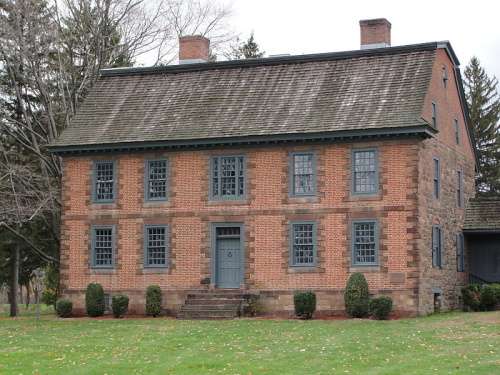
Dey Mansion
One Last Skirmish
On July 15, 1780, Scammell was at Washington’s headquarters in Preakness, the Dey mansion in Wayne, N. J. Washington was preparing for the Siege of Yorktown. Scammell nursed a broken heart, as Miss Nabby’s father did not write him back. He wrote to her father again, thanking him for his past hospitality. His hope had vanished, he wrote, and he hoped his daughter would bestow her hand on some worthy gentleman.
In May 1781, Alexander Scammell had command of a light infantry, the vanguard for the army’s march to Yorktown. On Sept. 30, 1781, he was scouting fortifications that the British had recently abandoned. He came upon a British cavalry patrol that he mistook for Americans.
When he realized his mistake he surrendered, but another cavalryman came up behind him and shot him in the back. The British paroled the wounded prisoner to a hospital in Williamsburg. Alexander Scammell died there on Oct. 6, 1781.
Afterward
Abigail Bishop married Dr. Archelaus Putnam of Danvers, Mass., on Nov. 12, 1786. He was 46, she was 33. Abigail Adams’ sister, Elizabeth Smith Shaw, wrote a letter to her niece suggesting Nabby Bishop married for money rather than love.
“Cupid I fancy got fast asleep in his Mothers Lap, and old Plutus, has yoked the dove,” she wrote to Abigail Adams Smith on Nov. 27, 1786.
Abigail Bishop Putnam had one daughter and one son who survived childhood. Archelaus Putnam died on April 14, 1800. She died in Medford on Dec 17, 1807. Her mother outlived her.
* * *
Read more about Alexander Scammell and the stories of other historic figures who fell in love in Love Stories From History. Click here to order your copy.
This story about Alexander Scammell was updated in 2024.
Image of Dey Mansion By Cmileo88 – Own work, Public Domain, https://commons.wikimedia.org/w/index.php?curid=11974191. The image of Middlebrook encampment entrance By Ekem at the English language Wikipedia, CC BY-SA 3.0, https://commons.wikimedia.org/w/index.php?curid=38449076. Image of Alexander Scammell PD-US, https://en.wikipedia.org/w/index.php?curid=22608823.
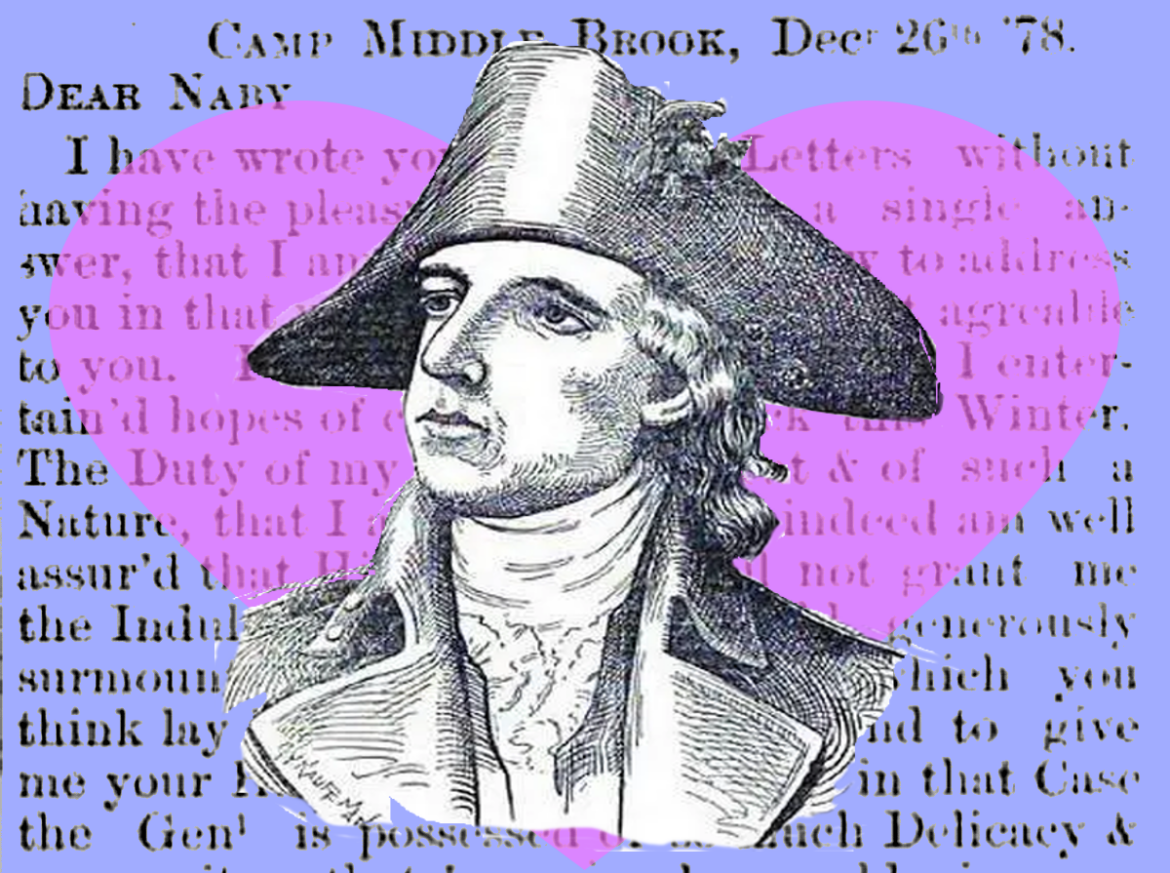
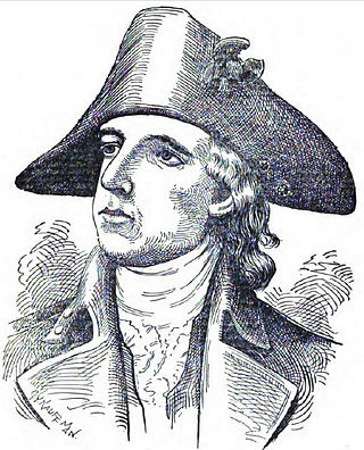
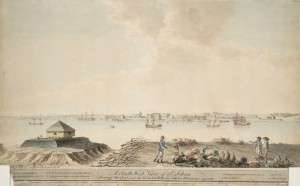



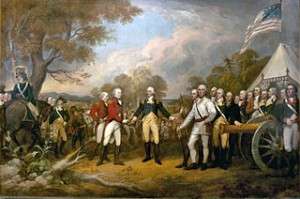
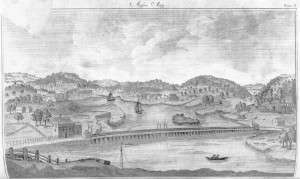

6 comments
[…] fighting. Finally Cochran offered to surrender his sword, but the raiders let him keep it. Then Alexander Scammell, a Harvard-trained lawyer from Durham, pulled down the British flag flying over the fort. Cochran […]
[…] intermixing with the hoi polloi in Plymouth’s taverns. The Club claimed Revolutionary War hero Alexander Scammell as a […]
[…] Scammell Dearborn, son of Secretary of War Henry Dearborn and named for Dearborn’s friend Alexander Scammell. He had help from Jacob Bigelow, a physician who thought it unhealthy to bury people under […]
[…] He also won election as town messenger for the Committee of Safety, which meant he had to carry news to and from Exeter, N.H. On Dec. 13, 1774, he rode with Paul Revere to warn Portsmouth citizens of the approach of two British warships. The British intended to retake gunpowder and weapons stolen by the colonists from Fort William and Mary. […]
[…] too. Tenney had served as a surgeon in the American Revolution with George Washington, and he returned to Exeter with an eye toward politics and […]
[…] Scammell Dearborn, son of Secretary of War Henry Dearborn and named for Dearborn’s friend Alexander Scammell. He had help from Jacob Bigelow, a physician who thought it unhealthy to bury people under […]
Comments are closed.